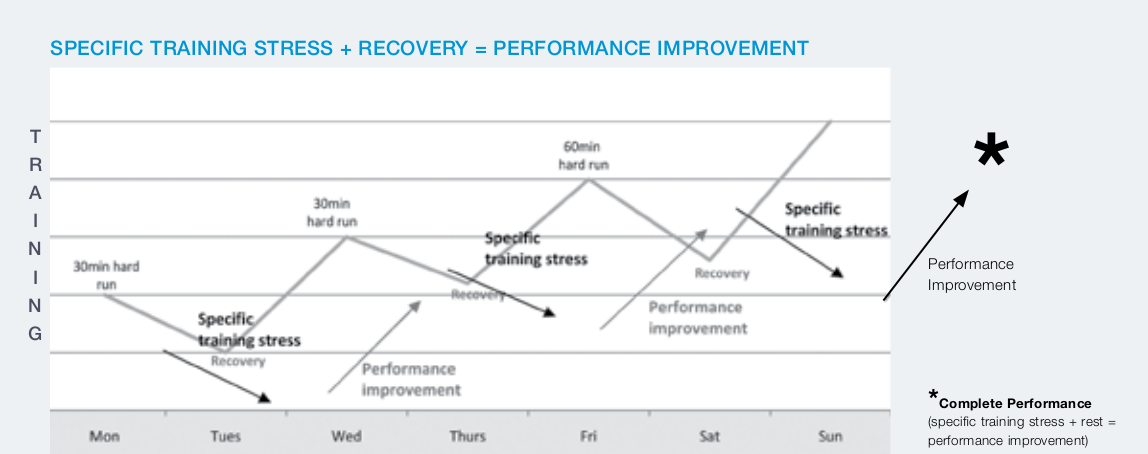
The Missing Link To Your Training Success
25 April 2016, 1:04PM
Rosie Shakespeare
It’s a very simple thing and I think we gloss over it way too much in our drive to push ourselves to be better and better – this is only ultimately to our detriment. What am I talking about? Recovery!
This needs to be one of the most important things in your training plan. If you don’t recover then you don’t move forward and all that hard work ends up being a waste of time. You start digging the hole and then you jump right on in. So, I have a graph below that hopefully will show you clearly how the whole training then rest will make you improve.

Below are factors that affect specific training stress and your ability to recover properly.
Specific training stress
Intensity – The harder you go the more stress your body will need to recover from e.g. a 20km cycling time trial vs a 20km easy ride with friends.
Duration - The longer the session the more stress endured
Type of exercise e.g. running is more stressful than cycling
Recovery
Good nutrition & hydration
Good amount of sleep
Life stress e.g. work, family relationships
NB – it is when we recover properly that our body is able to adapt from the training stress (exercise) and become fitter than we were before.
Possible outcomes from insufficient recovery:
Injury
Sickness
Decreased performance
Loss of motivation
Getting the balance right, between training and recovery will lead to your
Complete Performance!
Let me decipher this for you
The graph shows a level of fitness prior to a 30min hard run. After this training session or specific stress you have placed your body under, your “level of fitness or performance” will drop. Now here is the most important part – unless you take the time to recover here, then your performance and fitness will not improve, instead it will keep droppingoff. However, if you listen to your body, then you will improve as the green line shows and be slightly above where you were when you started. If you keep training sensibly and listening to your body and your coach then your performance will improve.
How much stress your body is placed under and how much you need to recover relies on:
The intensity of the session – the harder you go, the more stress you put your body under.
Duration – the longer the session the more stress endured and the type of exercise – ie, running is more stressful than cycling.
So what is recovery?
This falls under so many banners and can mean different things for different people. It includes:
• Good nutrition and hydration
• A good amount of quality sleep
• Life stress management eg work, family relationships
• Massage
• Compression garments
• Hot/cold therapy
• Ice baths
• Stretching
• Active recovery (ie gentle exercise)
It is only when we recover properly that our bodies can adapt from the training stress (exercise) and we become fitter than we were before.
This is something that everyone has to work out for themselves eg what is a “good night’s sleep” for them. Also if you are a full time athlete then your recovery day might include active gentle exercise. For someone who is working fulltime, this would not be helpful at all. A day off would slot in better for them.
If you don’t listen to your body or take the time to add in this vital ingredient to your training then you run the risk of:
• Injury
• Sickness
• Decreased performance
• Loss of motivation.
It’s a fine balancing act getting this all right and this is where a coach can be invaluable.
I have included some quotes from athletes that Complete Performance has been working with and their own understanding of how this has worked or not worked for them.
.jpg)
Photo courtesy of New Zealand Multisport and Triathlon
Anita Paling writes:
Exercise stresses the body. And if the body is already stressed then you need to back off the exercise.
In my tired over worked state my 30 minute run probably stressed my body the same amount as a 60 minute run would had I been feeling on top of the world.
As for the programme, apparently I’m the only person that has a good idea of how I’m feeling and that gives me the right to make changes to ensure that I’m not out there slogging away on a run that doesn’t seem very rewarding. Now I feel slightly empowered. The ongoing battle will be to listen to my body and then act sensibly.
Burnout by Hilary Cave:
Saturday, January 23rd 2010. It’s three weeks out from this year’s big race. My work mates’ wedding is today, the Timaru tri is tomorrow and a major work project (involving 44 students for 16 weeks) starts on Monday. I’m sorted.
Except for one thing; I can’t get out of bed. My boss sends me back to the office to get an important document which I seem to have forgotten. I get there and I can’t remember what I’ve been sent to do. The day continues in this fashion. And the week does too. I’m not that sharp; things are happening slowly and I work short days. It should be the last ‘hard’ training week before the big race; instead I think I should rest. Then there’s just a hazy blur of heavy, tired, tired bones, and sleep that doesn’t revive me. Doctors look at me, tell me to rest, take my blood, and, optimistically, prescribe iron. Two days later it came back. I could sense the heavy tiredness creep slowly up. First my legs, then core, chest and shoulders, then total exhaustion.
More time off work. They were managing. They got a temp in; she was great.
And so it went for a few scary months.
I was sick. And I wouldn’t get better unless I really changed things; worked less, and exercised only very recreationally. Finally I listened. Slowly, I began to get better.
To read the full stories here please go to www.completeperformance.co.nz.
At the end of the day, you know your body best, listen to it and look after yourself.
Have fun out there!! And remember: Getting the balance right between training and recovery = Performance Improvement.
Originally published in New Zealand Multisport and Triathlon Issue 77, September 2010
